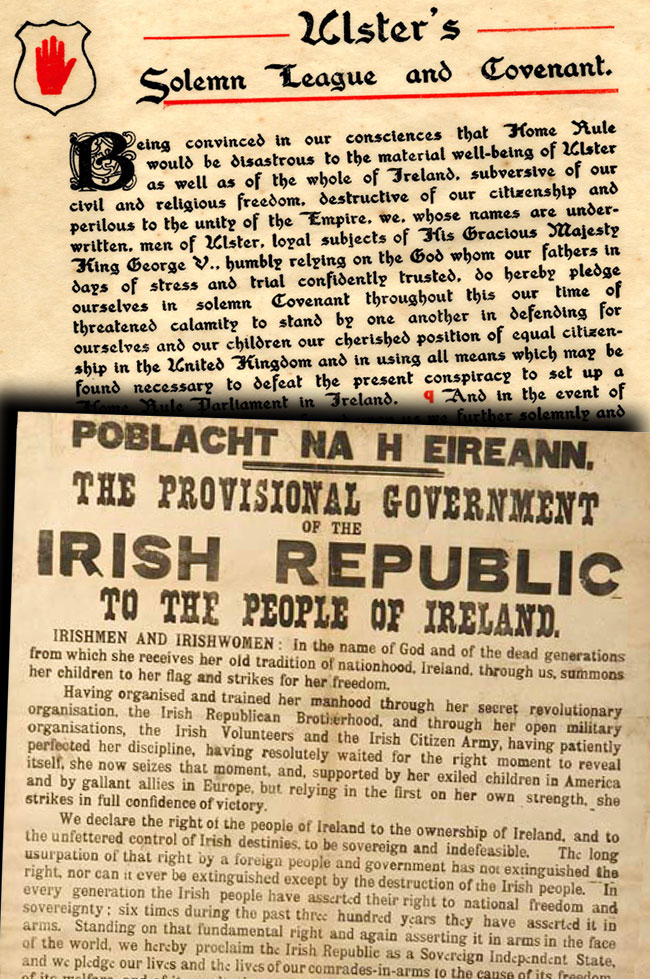5 January 2016 Edition
Respectful commemorations and exploring shared values – John McCallister
UNCOMFORTABLE CONVERSATIONS

• The decade of centenaries includes the outbreak of the First World War and the 1916 Easter Rising
Those who want to perpetuate the old divisive myths need to be confronted with the strength and vision of the new relationships on this island, of unionist and nationalist together respectfully commemorating events which have shaped and defined us all
WE are in a decade of centenaries – the Ulster Covenant of 1912, the outbreak of the First World War, the 1916 Easter Rising and Battle of the Somme, the first meeting of Dáil Éireann in 1919, the Government of Ireland Act 1920, the first meeting of the Parliament of Northern Ireland in 1921. There will, of course, be those who are only too eager to use the centenaries to trumpet old, divisive narratives of our past on these island. They will do so to sow new discord and new division in 21st century Ireland, seeking to undermine the peace and new relationships we enjoy on this island.
This poses significant challenges both for unionists and republicans. If, for example, unionists in Northern Ireland decide they will not be involved in any way in the commemoration of the Rising, or if Northern nationalists determine that they will not share in the commemoration of the foundation of Northern Ireland, we only give aid and succour to those who want to stir up the divisions of the past. We will be declaring that past divisions continue to shape today’s politics.
The truth is that each of these events whose centenaries fall in this decade have shaped all of us on this island, North and South, unionist and nationalist. Each of these events is part of a story we all share – the story of this island and these islands in the 20th century. As a British citizen, as someone who believes in Northern Ireland’s place in the contemporary United Kingdom, I would not describe myself as ‘celebrating’ the Easter Rising. That said, I think it is important that I commemorate it alongside nationalists, recognising the fact that it shaped both 20th century Irish history. Likewise, I would not ask Northern nationalists to ‘celebrate’ the Government of Ireland Act or the first meeting of the Stormont Parliament.
We have a model of how we can commemorate without denying our own political convictions.
When Her Majesty Queen Elizabeth II, during her state visit to the Republic in 2011, paid her respects to those who had fallen in the service of the Republic, she exemplified respectful commemoration. Such respectuful commemoration should mark how all of us approach the historic centenaries that lie before us over the next few years. Those who want to perpetuate the old divisive myths need to be confronted with the strength and vision of the new relationships on this island, of unionist and nationalist together respectfully commemorating events which have shaped and defined us all.
Alongside respectful commemoration, there are two other aspects of the centenaries that should be acknowledged.

• The Ulster Covenant and the 1916 Proclamation
When it comes to the centenary of the creation of the state of Northern Ireland, those of us who are unionists need to find ways in which to recognise those for whom it was, to say the least, no cause for celebration. Space needs to be created, in other words, to acknowledge the Northern nationalist experience. The same challenge should also face republicanism regarding the commemoration of the centenary of the Rising and the first sitting of Dáil Éireann. For a not insignificant minority in the southern part of this island, these events led to a story no less bitter than that told by Northern nationalists.
Our centenaries need to be characterised by a generosity towards the minorities which emerged on both parts of the island as a result of these events.
The second aspect of the centenaries is quite different.
Our commemorations should also be an opportunity to explore and affirm shared values. Think, for example, of the Ulster Covenant’s commitment to “equal citizenship”, “civil and religious freedom” and “material well-being”. We also find these values in the Proclamation of the Republic: “The Republic guarantees religious and civil liberty, equal rights and equal opportunities to all its citizens.” Think too of King George V’s words at the 1921 state opening of the Parliament of Northern Ireland: “I appeal to all Irishmen to pause, to stretch out the hand of forbearance and conciliation, to forgive and to forget, and to join in making for the land which they love a new era of peace, contentment, and goodwill.”
The years since 1998 have shown that peace and progress cannot be taken for granted, and that unionism and republicanism both have a responsibility to demonstrate a spirit of generosity if a greater, more authentic reconciliation is to be achieved. How both our traditions approach the centenaries of these years is crucial to achieving such reconciliation.
» JOHN McCALLISTER MLA is a Independent Unionist member of the Assembly
Editor’s Note: Guest writers in the Uncomfortable Conversations series use their own terminology and do not always reflect the house style of An Phoblacht.




